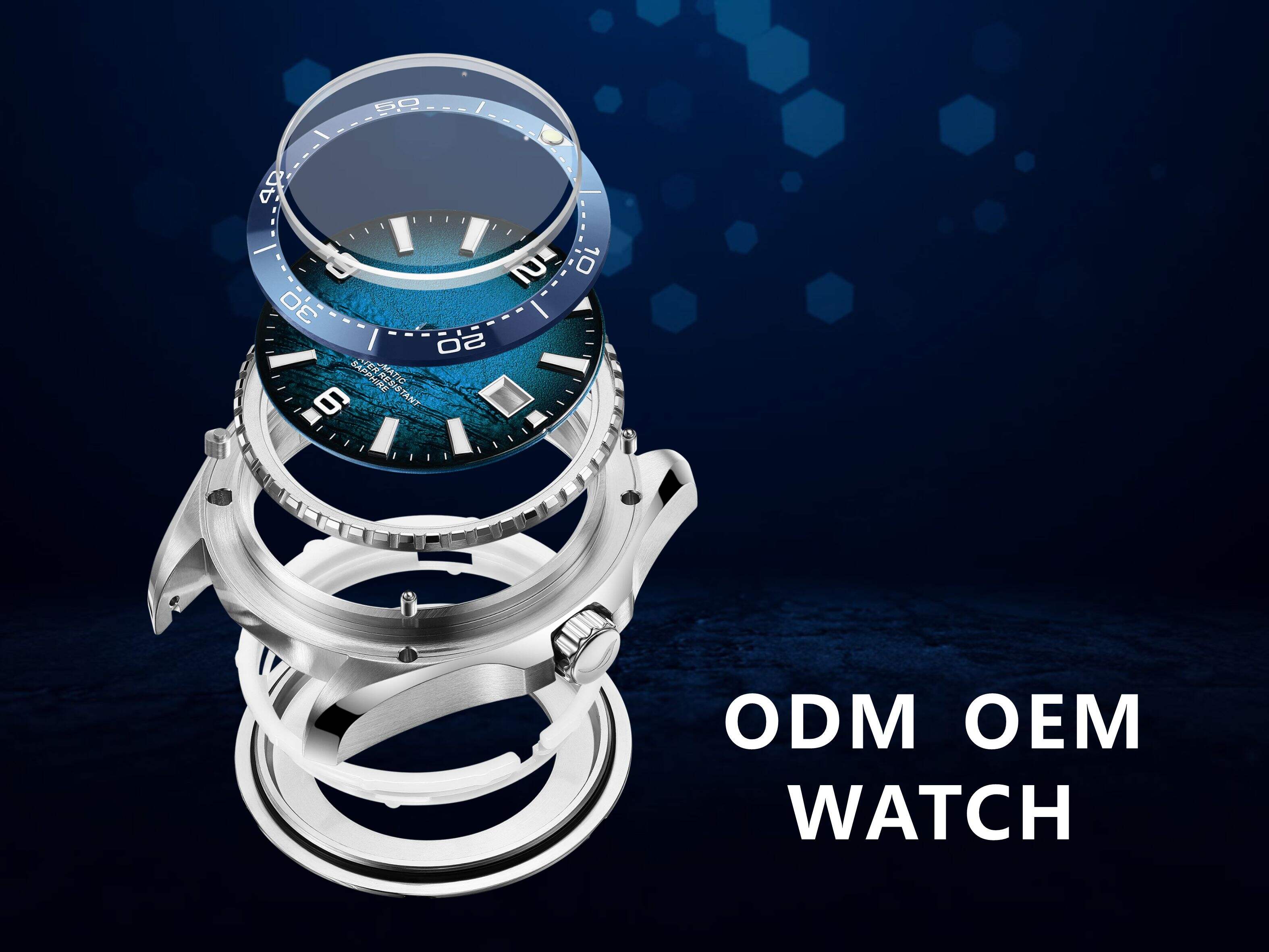Understanding ODM Watch Manufacturing: Evolution and Strategic Value
What Is ODM Watch Manufacturing?
When it comes to making watches, many brands turn to ODMs Original Design Manufacturers who let them create distinctive timepieces without needing their own design staff. These manufacturers take care of all aspects from initial ideas right through actual production, bringing together watchmaking knowledge and modern engineering skills. According to recent market data from 2024, around 6 out of 10 new watch companies are using ODM services these days to stand up against big name luxury brands. This trend is really changing how the watch business works, giving smaller players a fighting chance in what was once dominated by traditional high end makers.
OEM vs ODM in Watchmaking: Key Differences and Business Implications
While OEM (Original Equipment Manufacturer) partners simply produce client-specified designs, ODM watch manufacturers provide strategic value through integrated design-to-production solutions. This distinction creates measurable advantages:
| Factor | ODM Model Impact | OEM Model Limitations |
|---|---|---|
| Development Costs | 45-60% reduction (WatchTech 2023) | Full R&D investment required |
| Time-to-Market | 8-12 week acceleration | 6-8 month typical cycle |
| Technical Innovation | Built-in access to latest technologies | Client-driven specifications only |
This operational shift allows brands to reallocate resources toward market positioning and consumer engagement.
The Growth of ODM Services in the Global Watch Industry
The global ODM watch sector has grown by 18% annually since 2020, driven by three key factors:
- Customization Demand: 78% of consumers now prioritize personalized features over brand legacy (Global Watch Trends 2024)
- Sustainability Pressures: ODM manufacturers lead in implementing recycled materials (42% adoption rate vs. industry average of 19%)
- Smart Technology Integration: Hybrid mechanical-digital designs now account for 31% of ODM production, versus 9% of OEM production
This operational shift allows brands to reallocate resources toward market positioning and consumer engagement.
Core Technological Innovations Reshaping ODM Watch Design
The global ODM watch sector has grown by 18% annually since 2020, driven by three key factors: Customization Demand, 78% of consumers now prioritize personalized features over brand legacy (Global Watch Trends 2024). Sustainability Pressures: ODM manufacturers lead in implementing recycled materials (42% adoption rate vs. industry average of 19%). Smart Technology Integration: Hybrid mechanical-digital designs now account for 31% of ODM production, versus 9% in OEM production.
Core Technological Innovations Reshaping ODM Watch Design
Watchmakers blending traditional aesthetics with modern tech offer features unseen before. Data from Wearable Tech Index 2024 shows these watches offering hybrid designs: combining classic looks and smart features like contactless payment and dynamic watch face connectivity. Women's watches even adapt their face design when synced with compatible smartphones, highlighting innovation in customized watchmaking.
Advanced Materials and Engineering in Modern ODM Timepieces
Recent advances in materials have made it possible to use recycled stainless steel, ocean-reclaimed plastics, and plant-based polymers in production. This push towards longer-lasting, activewear-style designs aligns with consumer demand for sustainable and durable timepieces.
Customization and Personalization: The ODM Competitive Advantage
Customization is key in the ODM model with brands able to offer wide ranges of case, dial, and strap combinations. Such modular systems increase customer retention by about 23% and reduce storage costs. Digital platforms further empower customization, with 87% of decisions made before production, reducing errors and improving user satisfaction (Circular Electronics Study 2023).
Digital Platforms for User-Driven ODM Watch Creation
Advanced web configurators now enable 87% of customization decisions pre-production. Haptic feedback simulations are used to demonstrate weight distribution to the consumer, significantly reducing product returns and increasing consumer satisfaction.
Personalization Trends
With bands featuring adjustable systems increasing by approximately 142% in popularity. Mixing materials like 18k gold plating with quick-release silicone offers luxurious yet customizable wrists, featuring unique design elements that cater to both aesthetics and functionality.
Sustainability and Longevity in ODM Watch Production
Top ODM companies now embrace eco-friendly materials such as recycled stainless steel and ocean plastic, with some transitioning to solar-powered production processes. These initiatives align with increasing consumer demands for sustainable practices, and have resulted in a 30% reduction in carbon footprints for leading ODM watchmakers.
AI, IoT, and the next generation of ODM watches
With AI tools gaining traction, ODM manufacturers are reimagining the design process, creating highly personalized timepieces informed by user data and local preferences. IoT integration is additionally enhancing functionality, with real-time health monitoring and on-device data processing gaining priority as consumers demand more from their wearables, aligning with the growing shift towards multifunctional technology (Wearables Market Analysis 2024).
FAQ
What is ODM watch manufacturing?
ODM (Original Design Manufacturer) watch manufacturing allows brands to create distinctive timepieces without needing their own design teams. These manufacturers manage everything from concept development to production, combining traditional watchmaking expertise with modern engineering.
How does ODM differ from OEM in watchmaking?
In watchmaking, OEM (Original Equipment Manufacturer) partners produce client-specified designs, while ODM manufacturers provide comprehensive solutions from design to production. OEMs are limited to client specifications, whereas ODMs provide strategic value by offering built-in access to the latest technologies and reducing costs and time-to-market timelines.
Why are ODM services growing in the watch industry?
The global ODM watch sector has been growing annually due to increasing demand for customization, pressures to incorporate sustainability practices, and smart technology integration.
How do ODM manufacturers contribute to sustainability?
Many ODMs are increasingly using eco-friendly materials like recycled stainless steel and ocean-reclaimed plastic, and have started implementing take-back programs to recycle or refurbish products, aligning with circular economy principles to reduce electronic waste.
Customization and Personalization: The ODM Competitive Advantage
How do ODM watch manufacturers provide customization options?ODM watch manufacturers offer a range of case, dial, and strap combinations to allow brands to diversify their offerings and meet consumer demands for personalized features.

